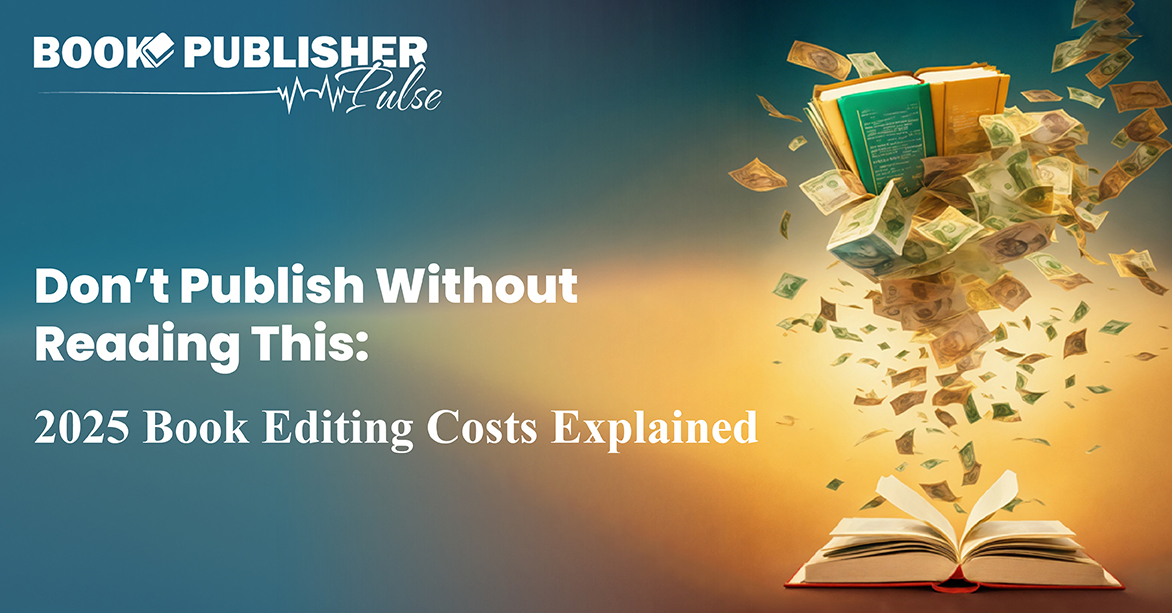So your manuscript is done. You put your heart and soul into every paragraph. Your story twists are quite convoluted. Your characters are real. But here's the fact that no one tells you after you finish writing: your book isn't done. Not even close.
Your tale requires a second pair of eyes before it can be published, sold, commended, or even appraised adequately by readers. The professional ones. That's where editing comes in, and believe us, it's not just about fixing typos and adding commas. Editing is like a makeover for your writing, and it might cost you the price of a pleasant supper or all of your vacation money.
Let's talk about what editing truly means, how much it will cost in 2025, and how you may make the best investment in your book's future.

Picture this: you stroll into a bookshop, open a new book, and see a mistake on the first page. How quickly would you put it back?
Yes.
Your tale could be great, but if it has foul language, slow pace, or awkward transitions, it won't matter. Readers will leave, agencies won't reply, and reviews will show it.
Editing fills in the gaps between what you intended to express and what ultimately appears on the page. The bridge will be smoother if your editor is better.
Editing, like coffee, comes in different intensities and styles. This is what you can eat:
In a way, this is like surgery on the structure. A developmental editor looks at the main parts of your tale. Character development, pace, plot arcs, and chapter order. This editor will highlight anything unclear or emotionally flat and help you revise it. Perfect if your draft isn't quite ready yet.
We're getting closer now. Line editing is the process of making sentences better. The editor is the one who makes your writing sound good. They'll change the wording, cut out the extra words, and make sure your speech sounds like real people conversing, not machines acting.
Gather your grammar geeks. Now things become technical. A copyeditor examines for spelling, grammar, style, and consistency. It's not so much about the voice as it is about making sure you don't call your bad guy "Mr. Black" in Chapter 3 and "Mr. Blake" in Chapter 17.
This is the final step before publishing. Typos, extra spaces, multiple periods, and missing chapter titles are all things to look for. It's like looking in the mirror to see whether your teeth are clean before a first date.
Let's speak about money. You have to pay for editing, and that's how it should be. You're paying someone to find things in your work that you can't see.
That being said, rates vary depending on the editor's experience, the quality of your work, and the type of editing required. This year, these are some standard pricing ranges:
Line Editing $0.02 $0.05
Developmental Editing $0.025 $0.08
Copyediting $0.01 $0.03
Proofreading $0.005 $0.02
Proofreading $0.005 $0.02
For example, you have a manuscript of 80,000 words. You could pay:
That's not a lot of money, but consider this: You're not only paying for changes; you're also purchasing the future of your book. If you pursue the conventional approach, clean editing may lead to better reviews, increased trust from readers, more sales, and even attention from agents.
That's a great question. Editors don't merely roll the dice and give you a number. This is what may make the price go up:
Some editors charge by the hour, while others charge by the word or the project. Always seek clarification first.
You are not the only one who is unsure. A lot of authors aren't.
Here's a simple guide:
In actuality, a lot of writers require more than one round. If you don't have a lot of money, focus on the plot and sentence structure before you worry about commas.
This section may seem too much, but you have choices:
Request sample modifications. Look at what other people have said about them. Ensure they've experience in your field. And if they discuss their service in general terms or can't define what it involves, don't hire them.
A good editor won't merely fix your mistakes. They will push you, help you, and care about how well your book does.
Yes, for sure. This is how:
And keep in mind that more costly doesn't necessarily indicate better. Select the editor that suits your style and meets your needs.
Editing is the part of publication that no one talks about. It takes your great but untidy manuscript and transforms it into something that people will want to read all the way through and share with their friends.
Does it cost a lot? Yes, sometimes. But so is bringing out a book that doesn't do well because it wasn't ready.
So don't rush. Ask questions. Be wise with your money. And put money into your book as if it would be the following oversized item on someone's shelf.
Need assistance navigating the editing process or want a professional team to transform your rough copy into a polished,
published work? Visit Book Publisher Pulse and let's prepare your tale for publication.
Mailing Address: 30 Montgomery St Suite 605, Jersey City, NJ 07302, United States
© Copyright 2026 Book Publisher Pulse
info@bookpublisherpulse.com
516-558-6278